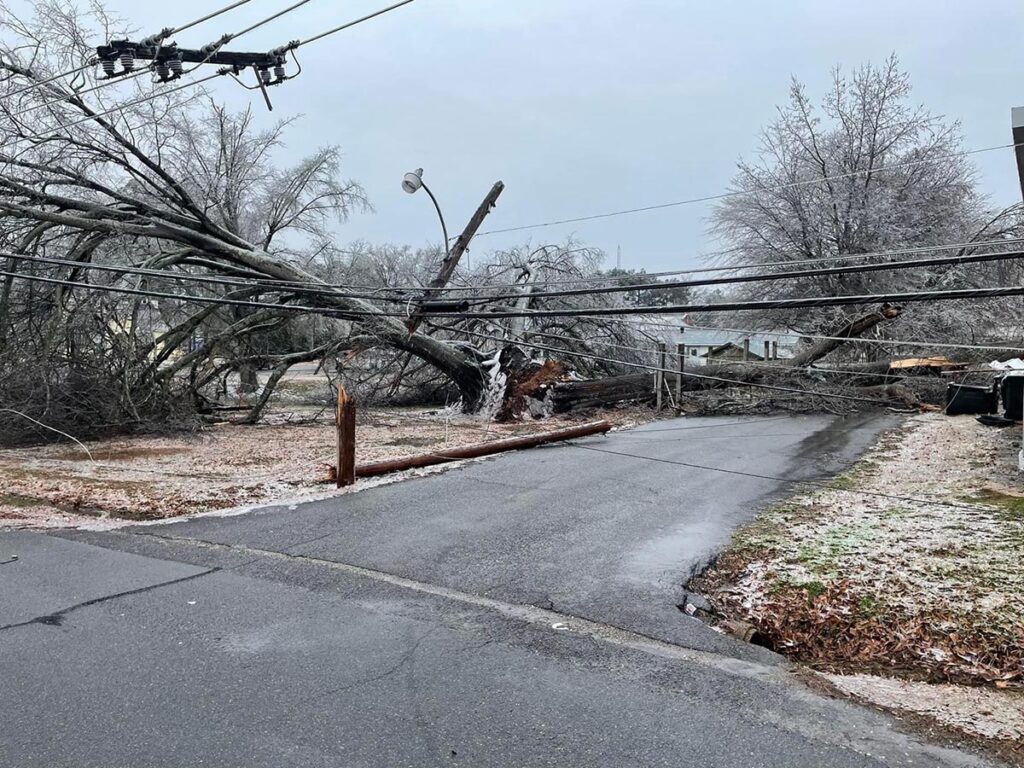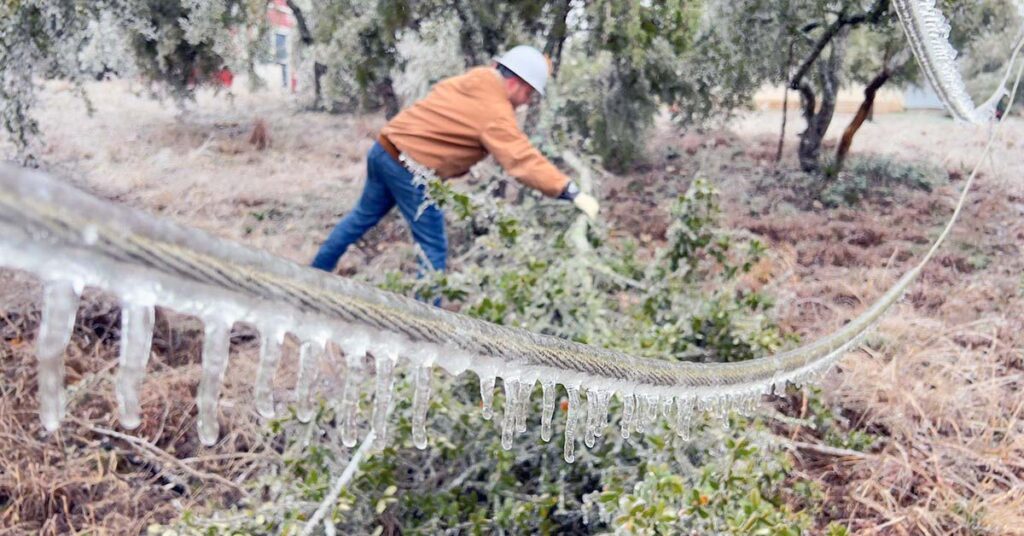
Updated: Feb. 6, 2 p.m. ET
While the worst of winter weather may still lie ahead, ice and snow in the Southern U.S. is already keeping electric cooperative line crews and contractors busy as they restore power to members in their own service territories and travel hundreds of miles to help the hardest-hit co-ops in their states with repairs.
“We’ve had three rounds of ice storms hit co-ops in Arkansas since mid-January,” said Mel Coleman, CEO of North Arkansas Electric Cooperative. “We’ve seen heavy wet snow accumulate on power lines like ice. Instead of having power lines encrusted with ice, snow has been clinging to trees and power lines, and that’s caused widespread outages in many areas.”
Crews and contractors worked for more than four days to restore service to more than 3,000 of the Salem, Arkansas-based distribution co-op’s meters following winter storms that hit its territory Jan. 23-24.
More winter weather swept across central and southern Arkansas Feb. 1, knocking out power to more than 30,000 meters served by electric co-ops.
“Three straight days of rain and then a round of freezing rain caused trees to snap and fall from their roots onto lines and roads,” said Rob Roedel, a spokesman for Arkansas Electric Cooperatives.
Right-of-way maintenance and construction crews from the statewide’s service unit headed to the territories of Star City-based C&L Electric Cooperative and Camden-based Ouchita Electric Cooperative to assist local crews with repairs. C&L EC reported that about 11,000 of its more than 21,000 meters remained offline early Monday as restoration work continued.
Arkadelphia-based South Central Arkansas Electric Cooperative reported about 25% of its more than 10,000 meters out of service in the aftermath of the storm, and crews worked through the weekend to reduce the co-op’s outages to less than 400 meters.
Electric co-ops in parts of Texas, Oklahoma, Mississippi and Tennessee have also reported outages from the recent winter weather.

Johnson City, Texas-based Pedernales Electric Cooperative spent four days repairing damage to its system to restore service to more than 81,000 of its nearly 385,000 accounts. Co-op officials said the weight of ice and snow snapped poles, broke splices and damaged lines. “Where with Winter Storm Uri we saw snow and lack of generation on the system, this storm has brought significant impact to the infrastructure,” said Eddie Dauterive, PEC’s chief operating officer.
The PEC response was an “all hands” event for the co-op with all available personnel and equipment deployed to make repairs and reenergize connections to all meters that could safely receive power, said Dauterive.
“These crews are also members, part of our communities with husbands, wives, children and grandparents,” he said, adding that about 1,000 meters remained without service Monday. “They are working around the clock to bring power back and we won’t stop until every last member is up.”
Much of the damage is being blamed on polar vortexes, a weather phenomenon characterized by large-scale cyclonic activity in the middle and upper atmosphere. When frigid temperatures combine with moisture from the Gulf of Mexico, the resulting storms can include more snow and ice, leading to more frequent and destructive damage from winter storms.
“Over the last three years, we’ve seen more freezing rain and ice accumulation instances than we saw in the previous 25 years,” said Sid Sperry, a winter reliability consultant. His firm, SPIDI Technologies, provides ice storm forecasts and recovery advice to more than 400 utilities, including electric co-ops in several states.
“In Arkansas, heavier ice accumulations are occurring further south,” said Sperry. “Ice season used to be November through March, but for more than a decade, there’s been a trend extending the season into April.”
February is typically the worst month for winter storm activity across much of the United States, so electric co-op executives and operations personnel are prepared to restore service to members as safely and as quickly as possible.
But even after initial repairs are completed, permanent repairs can continue for months.
“Even after repairs are done, winter storms have lasting impact that weakens your systems,” said Coleman. “Trees and branches keep falling for weeks and months, so crews will be busy into the summer dealing with damage related to this year’s winter storms.”
Derrill Holly is a staff writer for NRECA.